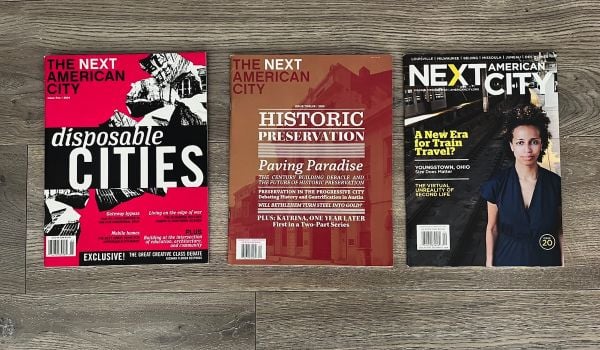Ten years ago, three recent college graduates sought to publish a magazine that would start a conversation about how cities were changing and which best practices would ensure more socially, economically and environmentally sustainable communities. They wanted to call this forward-thinking publication Next City, but at the time there was a Canadian program encouraging smarter urban policy by the same name. So to distinguish this new product, they called the magazine The Next American City.
A decade later, this once useful way of differentiating our work and editorial content has become a barrier. A couple times a month, I receive an invitation to have my organization serve as a media partner for a conference, but when the event has international speakers or an international focus, the mere brand of Next American City seems inappropriate. At the same time, many of the most exciting developments in urban policy — efforts to increase energy efficiency, government transparency, sustainable transportation or food access— are happening in cities abroad. We’ve sought to write about these stories with a comparative focus to the United States, but in many cases these cities deserve advocacy and coverage independent of how they relate back to America.
This is most true about rapidly urbanizing cities that are located predominantly in the Global South. Over the next 30 years, most urban growth will occur in these cities. It’s a situation that has no comparison to the United States — except that our whole world’s future depends on these cities being denser, more efficient and more livable than the American cities of the 20th century. Out of a desire to cover urbanization without any boundaries we are, as of today, dropping “American” and becoming Next City.
What will this mean for our coverage? Expect one or two Forefront stories each month to have an international focus. Expect more blog posts to be sourced from writers and partners abroad. But most importantly, in early January, we will be sparking a conversation about the future of six rapidly urbanizing cities: Accra, Bangkok, Chennai, Lima, Manila and Nairobi. With generous support from The Rockefeller Foundation, we will be covering The Informal City Dialogues, a project that seeks to understand the relationship between the formal and informal in our cities and to envision a different, more inclusive and resilient future. In the meantime, you can bookmark the project’s webpage (set to launch in early January), join our Facebook page and follow the project on Twitter. An official announcement with many more details about this project and its many partners will be made later this week.
Thanks for your support over the past decade. We’re extremely excited about our 10th Anniversary next year, this next decade and hopeful that this first foray into major international coverage will spark many more opportunities to delve into our global pursuit of more sustainable and just cities.











